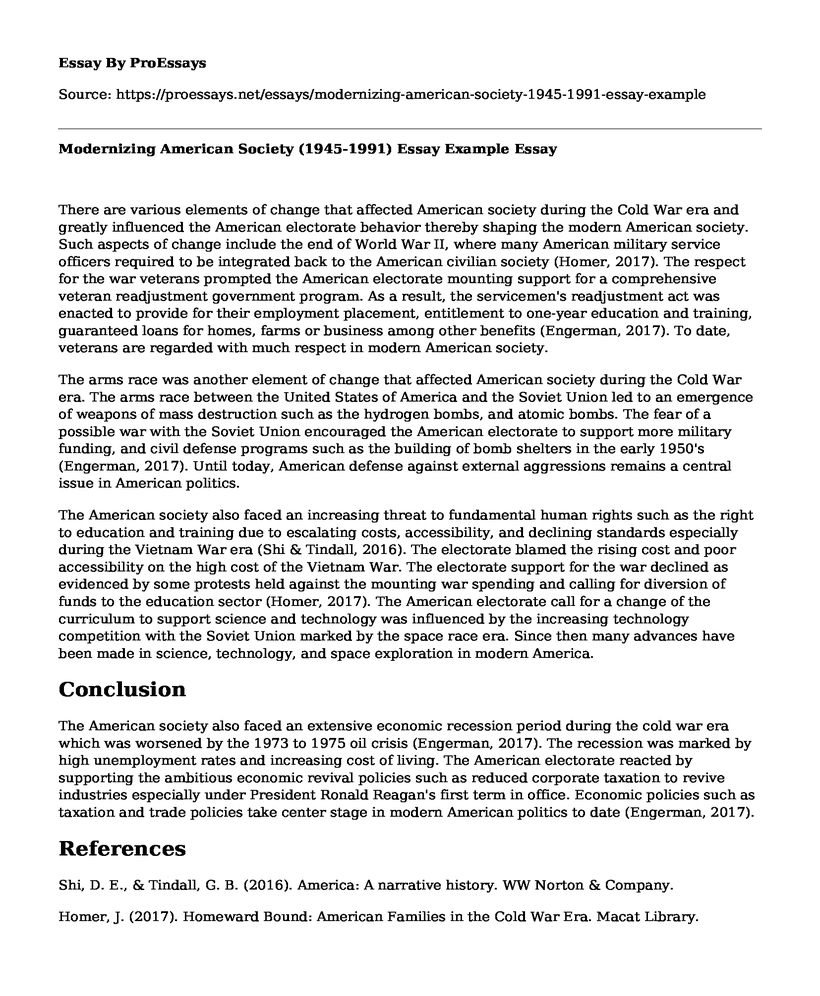There are various elements of change that affected American society during the Cold War era and greatly influenced the American electorate behavior thereby shaping the modern American society. Such aspects of change include the end of World War II, where many American military service officers required to be integrated back to the American civilian society (Homer, 2017). The respect for the war veterans prompted the American electorate mounting support for a comprehensive veteran readjustment government program. As a result, the servicemen's readjustment act was enacted to provide for their employment placement, entitlement to one-year education and training, guaranteed loans for homes, farms or business among other benefits (Engerman, 2017). To date, veterans are regarded with much respect in modern American society.
The arms race was another element of change that affected American society during the Cold War era. The arms race between the United States of America and the Soviet Union led to an emergence of weapons of mass destruction such as the hydrogen bombs, and atomic bombs. The fear of a possible war with the Soviet Union encouraged the American electorate to support more military funding, and civil defense programs such as the building of bomb shelters in the early 1950's (Engerman, 2017). Until today, American defense against external aggressions remains a central issue in American politics.
The American society also faced an increasing threat to fundamental human rights such as the right to education and training due to escalating costs, accessibility, and declining standards especially during the Vietnam War era (Shi & Tindall, 2016). The electorate blamed the rising cost and poor accessibility on the high cost of the Vietnam War. The electorate support for the war declined as evidenced by some protests held against the mounting war spending and calling for diversion of funds to the education sector (Homer, 2017). The American electorate call for a change of the curriculum to support science and technology was influenced by the increasing technology competition with the Soviet Union marked by the space race era. Since then many advances have been made in science, technology, and space exploration in modern America.
Conclusion
The American society also faced an extensive economic recession period during the cold war era which was worsened by the 1973 to 1975 oil crisis (Engerman, 2017). The recession was marked by high unemployment rates and increasing cost of living. The American electorate reacted by supporting the ambitious economic revival policies such as reduced corporate taxation to revive industries especially under President Ronald Reagan's first term in office. Economic policies such as taxation and trade policies take center stage in modern American politics to date (Engerman, 2017).
References
Shi, D. E., & Tindall, G. B. (2016). America: A narrative history. WW Norton & Company.
Homer, J. (2017). Homeward Bound: American Families in the Cold War Era. Macat Library.
Engerman, D. C. (2017). Development Politics and the Cold War. Diplomatic History, 41(1), 1-19.
Cite this page
Modernizing American Society (1945-1991) Essay Example. (2022, Sep 18). Retrieved from https://proessays.net/essays/modernizing-american-society-1945-1991-essay-example
If you are the original author of this essay and no longer wish to have it published on the ProEssays website, please click below to request its removal:
- Prohibition of Alcohol in American History Essay
- Most Important Event in History: World War II - Essay Sample
- Air Pollution Caused by Plastic and Oil Companies in China
- Essay Sample on the Horrific Consequences of War: U.S. in WWII & Vietnam
- Biracial Individuals: A New Societal Challenge - Research Proposal
- Essay Sample on In the Looking Glass: The Impact of the Internet on Society
- Essay Example on Fredrick Douglass: Slave to Icon of Black American History







